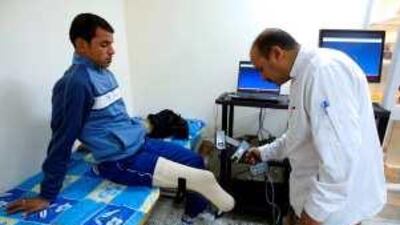Iraq has budgeted US$3.8 billion (Dh13.95bn) to rebuild its healthcare sector this year and maintains the country is open for foreign investors despite security concerns. For years, the Iraqi healthcare system was the envy of the Arab world, with its hospitals providing world-class treatment and students studying medicine at reputable universities.
But after years of war and civil strife, Iraqi officials are trying to repair a country that has seen almost all of its medical facilities and supply manufacturers destroyed, while many of its doctors have fled. Many multinational companies looking to invest in the oil-rich country have been discouraged as the threat of instability has stalled development. At last week's Arab Health trade show in Dubai, Dr Salah Shubber was looking to fix Iraq's healthcare problems.
A former pharmacy owner in Canada, Dr Shubber returned to Iraq two years ago to serve as ministerial adviser to the Iraqi ministry of health and is responsible for helping to decide how the ministry's funds are spent. Iraq's healthcare budget has remained steady at $3.8bn, but could be increased depending on its oil production, Dr Shubber said. The Iraqi constitution guarantees free health care to its citizens. The country spent about $124 per capita on health care in 2006, compared with GCC average spending of $631 per capita and a global average of $716 per capita, figures from the World Health Organisation showed.
The US and the UK spent $6,719 and $3,332 per capita respectively on health care. "Saddam [Hussein] left Iraq with nothing," Dr Shubber said. "Only two of our 30 pharmaceutical manufacturers are operational right now." There is a lack of investment from regional countries such as the UAE and Saudi Arabia, he said. While firms based in the UK, Turkey, India and Iran have begun to do business in Iraq, the investment was minimal and had not come close to modernising the medical infrastructure, he said.
"I wish they could come," Dr Shubber said. "The chance is for them now. Come first, serve first. We need their service now. We need the help of our brothers." UAE investors were responsible for spending commitments of $37.7bn, or nearly a quarter of all investment pledged to Iraq this year. Last week, Siemens Healthcare landed a $69 million contract to outfit Iraq's hospital infrastructure, one of the largest healthcare projects in the country's history.
Other companies involved in providing services and supplies include General Electric, Toshiba and Philips. Dr Shubber said that aside from building hospitals or fixing damaged ones, the country needed makers of pharmaceuticals and medical supplies, as well as administrative expertise. Even second-hand medical equipment was highly sought after. "We have many choices for the investor to go through, either through the private sector or through the government sector," he said.
A report published by the international non-government organisation Medact in 2008 said the Iraqi healthcare system was in disarray due to the lack of an institutional framework, huge staff shortages, intermittent electricity and unsafe water supply. Dr Shubber said that the area south of Baghdad extending to Basra, and the northern autonomous region of Kurdistan, were safe for travel and free of violent activity. Only the area surrounding Baghdad remained dangerous, he added.
dgeorgecosh@thenational.ae

Iraq seeks healthcare investors
Iraq has budgeted $3.8bn to rebuild its healthcare sector this year and maintains the country is open for foreign investors despite security concerns.
Most popular today
